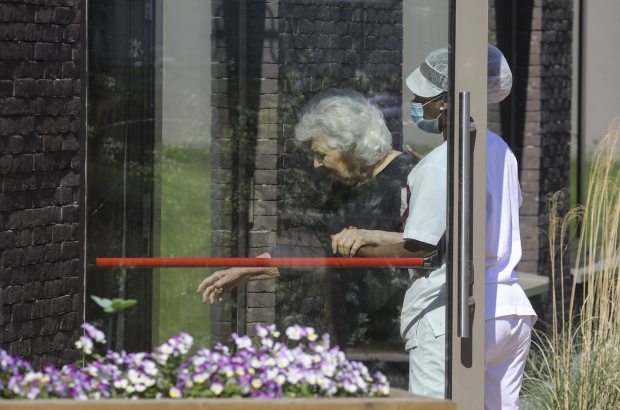- Daily & Weekly newsletters
- Buy & download The Bulletin
- Comment on our articles
Belgium ‘breached human rights’ in nursing homes, says Amnesty
A damning report published by Amnesty International Vlaanderen states that Belgian authorities were in breach of human rights regulations with regards to nursing homes during the first few months of the Covid-19 pandemic.
Rest home residents’ rights to life, health and non-discrimination were all violated during the spring and summer, according to the local chapter of the international human rights watchdog.
“At the beginning of the crisis, Belgian authorities knew good and well that nursing homes residents were particularly vulnerable to the Covid virus,” writes Amnesty International Vlaanderen in its summary of the report. “Just as in the hospitals, a quick and targetted response was vital. But nothing of this was seen. In fact, quite the opposite.”
Problems in the facilities included a complete lack of protective gear, such as surgical gowns and masks, no testing and no intervention when there were serious staff shortages. But there were also human rights breaches happening outside the facilities, such as ambulance drivers refusing to take residents to hospital if they were over a certain age.
“It was painful for personnel to see the difference between the scant materials they had and what hospital workers were wearing to care for Covid-19 patients,” Iris De Mol of the Association of Flemish Municipalities’ elderly care policy department told Amesty. “They had no FFFP2 masks and put themselves in danger just by caring for residents.”
Most residents who died from the effects of Covid-19 did so in the nursing home rather than in a hospital because ambulance drivers who were called refused to take them. Caregivers were told to “give them extra morphine”. Paramedics themselves were apparently instructed to not pick up rest home residents who were above a certain age – sometimes 75 but sometimes as young as 65.
“Despite these shocking conditions, the government only took action when the information began leaking out to the public, and that wasn’t until the worst was over,” reads Amnesty’s summary. “Regular testing – a crucial safeguard against the transmission of Covid-19 – was only introduced in August.”
As more and more peronnel fell ill, an already understaffed sector became a disaster zone, says Amnesty. Residents were left in their pyjamas for days without proper hygeinic care and even, in the worst cases, without regular meals. Many residents became dehydrated.
In at least two instances that Amnesty was able to confirm, neglect led to death. One man told the organisation that he called his mother’s rest home every day. “Every time, they were very positive. ‘She is in her room, she has eaten, she is relaxed.’ When visiting was again allowed, I went into her room, and she was laying there half dead, emaciated. I called a doctor, and he said that she was completely dehydrated and that her sodium level was dangerously high. She hadn’t had water for at least 10 days.”
The 83-year-old woman was taken to hospital, where she was diagnosed with phlebitis – inflammation of the veins – in both legs. It was brought on by dehydration. This can often be corrected by surgery, but in this case it was too late. The woman died two days later.
A nursing home worker told her son: “My colleague is sick, and I was alone here with 20 people.”
While much was made in the news about visitors talking to their loved ones via video chat or on their phones on the other side of the window, this was not the case everywhere, explains Amnesty. Oftentimes residents were shut up in their rooms with no communication with the outside world for weeks at a time.
“When a lack of free movement is not based on individual risk-assessment, it is disproportionate and can be discriminatory,” says Amnesty. “Homes must strive to find the right balance between protection against the virus and mental health.”
Amnesty points to a federal government report from 2006 that laid out how nursing homes should prepare for an eventual viral outbreak. It included regular training, a budget for protective gear and hand gel and a protocol for testing.
In 2010, a pilot project was started, but four years later, the responsibility for the management of care facilities was transferred to the regions. “The plan was never fully rolled out because of budget reasons,” KU Leuven medical professor Jan de Lepeleire told Amnesty.
In the end, “Belgium failed to fulfill its human rights obligations and failed to protect the most vulnerable group during the pandemic,” says Amnesty. “Many residents have received substandard healthcare, and some elderly people probably died prematurely as a result.”
The organisation finishes with several guidelines it suggests the regional governments implement:
- Priority access to tests and protective gear
- Put the interest of the residents first when it comes to visitor guidelines
- Strive for balance between protecting residents from the virus and mental health
- Involve residents and personnel in crucial decisions that have an impact on their lives and work
- Deal with the shortage of labour in the sector
- Arrange inspections of nursing homes
Photo top: ©Thierry Roge/BELGA

















